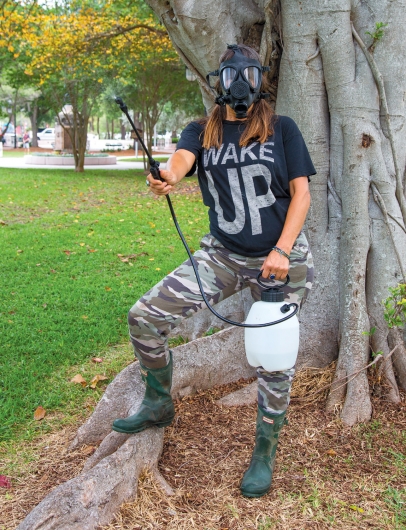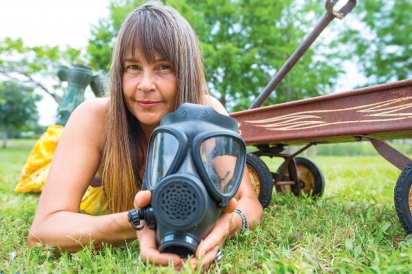Making Peace with Nature
Non Toxic Sarasota
On a late Sunday morning I’m meeting with Sharon Juraszek and Carissa Warfield for brunch. Sharon, clad in white jeans and a T-shirt printed with the words Wake Up, places two fragrant flowers in front of both Carissa and me. “Here, these are from my nontoxic garden,” she says.
While this was an enjoyable gathering, we were there to discuss a very important matter. One that should be top of mind for all those living in Sarasota and around the country.
This January Sharon made the commitment to locally lead the charge of Non Toxic Sarasota, an initiative under the national Non Toxic Neighborhoods (NTN) umbrella, to eliminate the use of glyphosate (the active ingredient in the pesticide Roundup) and other harmful chemicals for land management in parks, schools, neighborhoods, and public city spaces. NTN provides resources to local city chapters—there are nearly 50 U.S. cities onboard, including Sarasota—to aid in the transition to safe, organic land management.
These chapters work to educate about the importance of soil health and protecting children, farmers, and the food supply from the outdated and toxic chemical approach to managing weeds and pests by switching to proven organic management programs.
The National Cancer Institute notes that children are especially vulnerable to pesticides. The probability of an effect such as cancer, which requires a period of time to develop after exposure, is higher if exposure occurs early in life.
Carissa, who holds a degree in natural resources and environmental science, studied these issues over two decades ago and says, “Time and science reveal long-term effects of environmentally irresponsible maintained landscapes.” For years, she adds, consumers thought “‘Why would companies [such as the makers of Roundup] hurt me?’ We trusted marketers. We didn’t question them.” Now, she says, “We have to question things.”
After parks and playgrounds have been sprayed, children are advised to stay off of them for 72 hours. What is not taken into consideration is that rain reactivates the toxins. The weeds and ant piles are gone, but at what cost of the convenience?
These toxic chemicals mimic hormones. The body absorbs them and disrupts natural functions, resulting in failed endocrine systems and causing auto immune issues.
“Environmental health is a direct link to public/personal health,” says Carissa.
Today, $2 billion cancer lawsuits against Roundup manufacturer Monsanto making national news. Billions of people’s health is compromised in exchange for “beautiful” lawns.
Sharon suggests that we have all been brainwashed with marketing to think perfectly manicured lawns and landscapes are beauty. She advocates less toxic strategies, including safe, cost-effective alternatives like white vinegar and water. Better yet, pull weeds with your hands and reap the benefits that will help boost your brain health and improve your immune system through exposure to naturally occurring microbes found in the dirt.
The “weeds” themselves can have extraordinary medicinal properties and may be used for their anti-cancer, anti-fungal and anti-inflammatory benefits. Weeds act as a filtration system to ward off algae that is blooming in our waters. The white flowered ones, Bidens alba, also are the third-most-reliable source of nectar for pollinators in the state of Florida.
“Action has to happen on an individual level,” Sharon stresses. “It has to come from us.”
Later that day, I’m out in my own backyard teeming with weeds and I watch as bees pollinate the Bidens alba, flower to flower. I had never noticed that before, rather just saw weeds creeping through the cement blocks and growing too long in the garden. Now I see it as a thing of beauty, our ecosystem working organically according to nature’s plan.
WHAT CAN YOU DO?
Speak up to lawn care companies, asking them to use nontoxic products. Talk to neighbors who have these chemicals sprayed, school officials, store managers, etc. Ensure toxins are not being used in your yard, golf courses, and neighborhood associations.
Learn alternatives. Peppermint and other essential oils repel mosquitos and other insects; a line of chalk deters ants; vinegar kills weeds. There is also an organic preferred product list on the NTN website.
Join the Non Toxic Sarasota Facebook page to stay informed and advocate for a pesticide- free community.
Show up to City Commission meetings to raise awareness, educate, and work with city staff and elected officials to switch to safe landscape practices.






